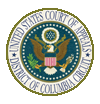- Courthouse
- Location
- Parking
- Public Transportation
- Courthouse Entrances
- Screening Information
- Electronic Device Policy of the U.S. Courts of the D.C. Circuit
- Courthouse Decorum Policy
- Liquids Policy
- Courtroom Locations
- Use of Facilities by Outside Groups
- Inclement Weather Notice
- Cafeteria
- Employment
- Solicitations
- Judges
- Resources & Contacts
- Case Information
- Attorney, Pro Se, and Media
- Advisory Committee on Judicial Conduct
- Notice of Change of Address
- Brief Compliance Checklist for Pro Se and Attorney Filers
- Notification of Scheduling Conflicts
- Attorney Admissions Information
- Criminal Justice Act Information and eVoucher
- Information for Litigants Representing Themselves (Pro Se)
- Attorney Rules of Disciplinary Enforcement
- Mediation Program
- Inclement Weather Notice
- Media Information
- Sealed Filings
- Rules & Procedures
- Circuit Rules
- Handbook of Practice and Internal Procedures
- Circuit Rules Proposed Amendments
- Circuit Rules Recent Amendments
- General Notices
- Guantanamo Cases - Orders Having General Application
- En Banc Endorsement of Panel Decisions (Irons Footnote)
- Mandatory Conflict Screening Plan
- Privately Funded Seminars
- Judicial Misconduct
- Site Map
Electronic Device Policy of the
U.S. Courts of the D.C. Circuit
I.
General Rule – Visitors may bring electronic devices (e.g., cell phones, laptops, tablets, smart watches, etc.) into the courthouse and annex. All devices will be screened by Court Security Officers upon entry.
II.
Use of Electronic Devices in Public Areas – Visitors may use electronic devices in public areas of the courthouse and annex. However, for reasons of privacy, safety, and security, visitors may not take photographs, make audio or video recordings, or transmit live streaming audio or video. The only exceptions when expressly permitted are special events, ceremonies, receptions, or other approved activities that may take place in the atrium, cafeteria, corridors, or other public areas.
III.
Use of Electronic Devices in Courtrooms
- Court of Appeals Proceedings – All electronic devices with cellular or WiFi capability must be turned off or put in airplane mode before entering a courtroom in which a Court of Appeals proceeding is being held. The use of electronic devices to take photographs, make audio or video recordings, or transmit live audio or video streaming is prohibited.
- District and Bankruptcy Court Proceedings – All electronic devices with cellular or WiFi capability must be turned off or put in airplane mode before entering a district or bankruptcy courtroom. The use of electronic devices to take photographs, make audio or video recordings, or transmit live audio or video streaming is prohibited. However, with the express prior approval of the presiding judge, electronic devices may be used to transmit and receive data communications, such as email or text messages, and to access the Internet ONLY.
- Exceptions – With the express prior permission of the chief judge, presiding judge, or court executive of the sponsoring court and under such conditions as he or she may prescribe, electronic devices may be used to photograph or record a court ceremonial function held in a courtroom (naturalization ceremony, investiture ceremony, portrait presentation ceremony, memorial service, special ceremony, etc.), an educational function held in a courtroom (moot court, training, meeting, interview, etc.), or an empty courtroom for use by educators and documentarians. The chief judge, court executive, or special assistant to the chief judge will notify the U.S. Marshals Service in advance of the event that use of these devices is authorized.
IV.
Violation of Electronic Device Policy – Any person violating this policy may be subject to contempt sanctions and/or barred from entering the courthouse and annex with electronic devices in the future.
Effective: April 9, 2007
Amended: November 23, 2009
Amended: December 6, 2016
Amended: June 5, 2018
Effective: July 1, 2018
Amended: November 23, 2009
Amended: December 6, 2016
Amended: June 5, 2018
Effective: July 1, 2018
